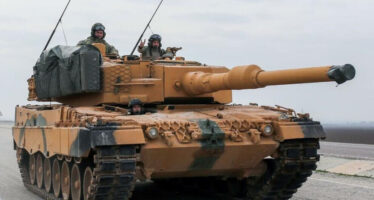Saudi Arabia and the prequel of the endless War

![]()
At the beginning it was George W. Bush.
Daniel Pipes, a scholar known for his anti Islamic view, was adviser for Middle Eastern politics of the Bush jr administration. In 2003 he argued that the attack of September 11 against the US had been “essentially Saudi in terms of ideology, material authors, organization and funding”; despite that “the US government has not shown any signs of wanting to review its policy toward Riyadh.”
Wars and oil
Where there is oil there is wealth. Where there is wealth there is corruptive power. Where there are oil and weapons, the situation becomes incandescent: Saudi Arabia is the fourth country in the world for military spending, over $ 80 billion in 2014, despite the fall in crude oil prices and the budget deficit to 15% of GDP. Where to all this you add up sectarian and religious strife, systematic violation of human rights and social injustice (as we have already mentioned, the area stretching from Egypt to Iran, including Syria, Iraq and the Arabian Peninsula, sees 60-70 % of GDP concentrated in the oil monarchies, which have only 10% of the population of that region) the mix, sooner or later, inevitably explodes.
According to Pipes, good relations with Saudi Arabia, depended not only on the American energy needs, but also on “the systemic preventive corruption adopted by the Saudis towards the various levels of US administrators both in Saudi Arabia and the USA.” “It may perhaps not be necessary to include Saudi Arabia in the Axis of evil or invade it, but it will be necessary to address and solve the role of the Saudis in the spread of extremism, if we really want to win the war against terrorism,” concluded the little heard advisor (Daniel Pipes, “National Interest”, Corrotti e sevili, in “Internazionale” n. 486, p. 36, 2003).
The origins of the business-strategy war
We have to remember that Bush jr, in his address to the nation in January 2002, had said the three main enemies of the US were Iraq, Iran and North Korea, defined indeed “Axis of Evil”, on the occasion alerting Americans to prepare for a long war against terrorism.
It was indeed the first move of that strategy of the “endless war”, which had already begun in Afghanistan and since then bloodily in progress; a strategy that, to widen, reproduce and stabilize needs (and has needed) to introduce the variable terrorism, namely to promote a continuous spiral of war-terrorism-war.
The format of this plan foresaw from the beginning to initiate an armed conflict with Iran too; the election of Barack Obama has caused a temporary suspension of that chapter, that now, at the end of his second term, however, is put back on the agenda, through Saudi provocations and gives new space to opposing views – beginning with Israel, but also in the US itself – to the nuclear deal with Iran, reached a few months back.
As we know, in fact, despite the role it played in September 11, Saudi Arabia has never been invaded, unlike Afghanistan and Iraq, the good relations with the USA oil-monarchy have never faded nor has failed the Saudi role in the promotion and facilitation of terrorism, as well certified by the very origin of ISIS-Daesh: the destabilization of Iraq, following the war tenaciously pursued by Bush, has created the conditions for the establishment of the Islamic State, which developed and grew with the support, weapons and funding of the Gulf monarchies, Saudi Arabia in the lead, with the active consent of the United States and the passivity of Europe.
The New American Century
At that time, George W. Bush preferred to rely on the assessments and proposals of other analysts: those of the Project for the New American Century (PNAC, an organization founded in 1997 with the stated aim of “promoting American global leadership “).
This think tank had already sent, back in 1998, a document to former President Bill Clinton, in which it argued the need for an intervention to bring down the regime of Saddam Hussein in Iraq, forcing the hand if necessary at the UN: “In the short term we must be ready to military action without regard for diplomacy. In the long term we must disarm Saddam and his regime. We believe that, based on existing UN resolutions, the US has the right to take all necessary steps, including the one to declare war, to secure its vital interests in the Gulf. US policy should under no circumstances be paralyzed by the misguided insistence on unanimity in the Security Council.” More clearly than that. That’s exactly what happened then, step by step, in the early years of this decade.
In the past, the documentation of these pressures (PNAC Letter to President Bill Clinton on Iraq, January 1998; Rebuilding America’s Defenses Strategy, Forces and Resources For a New Century, September 2000) was blatantly available on the organization’s website, www. newamericancentury.org, now no longer active.
The majority of the signatories of the 1998 text has, later, been part of the Bush Administration: Vice President Dick Cheney; his chief staff Lewis Libby; Defense Secretary Donald Rumsfeld; his deputy Paul Wolfowitz; Assistant Secretary of State Richard Armitage; the assistant secretary of defense for international security affairs Peter Rodman; Secretary of State for Arms Control John Bolton; Commission member Defense Richard Perle; Ambassador of Bush in the Iraqi opposition Zalmay Khalilzad; the assistant to the president and director for Business in the Middle East and North Africa Elliot Abrams; President of the PNAC and adviser to Bush William Kristol. Many of them, however, had worked with US administrations since the seventies.
Cherchez l’argent
Rather than analysts, however, it would be more appropriate to speak of a political-business group, since in many cases (as in that of Dick Cheney and Donald Rumsfeld, formerly at the top of the multinational Halliburton and Blackwater) they are directly concerned and benefited from war and post-war business. A business carefully planned, given that, after the Anglo-American invasion of Iraq, in March 2003, there were leaks of procurement already granted to some large US companies for the reconstruction of the country, a deal estimated at the time between the 25 and 100 billion dollars; on the other hand, the overall costs, direct and indirect, paid by the American taxpayers of the war in Iraq alone, were later estimated at three thousand billion dollars (Linda Bilmes, Joseph Stiglitz, The Three Trillion Dollar War: The True Cost of the Iraq Conflict. W.W. Norton & Company, 2008).
The post-war reconstruction was then entrusted to presidential envoy Paul Bremer, unexpectedly wanted by Bush, as he was considered to know very little about Iraqi politics. Otherwise, Naomi Klein wrote, “Bremer is an expert in getting reach with the war on terrorism and in helping US multinationals make money in far places where they are unpopular and treated coldly. In other words: it is the perfect man for this kind of work “(Naomi Klein, Iraq privatizzato, in “Internazionale” n. 491, pag. 13, 2003).
It was Bremer to choose, in May 2003, to demobilize the Iraqi army completely, about 400,000 men, mostly Sunnis, leaving their families to poverty, thus helping to form the basis for future Daesh militants and the popular consensus around them.
Even before the war in Iraq actually started, therefore, the beneficiaries of that strategy had already been identified: in part these were the same who planned it, then decided at the level of the US government and ultimately imposed on the world, despite all the evidence (the acceptance by Saddam of all requests, often confusing, in the previous months; the non-existence of the famous and fraudulent “smoking gun”, or the proof of weapons of mass destruction in the hands of the Iraqi president) and against almost everyone (most of the United Nations, the Pope and the Vatican, many world diplomacies, the global civil society and movements that, in February 2003, manifested in 600 cities mobilizing for peace a striking 100 million people).
The infamous story continues
If you forget this opening chapter, and the identification of subjects and economic and geopolitical interests in the field, it would be more difficult to see the sequel of this history, currently in progress.
One infamous and mystified story that, after Iraq and Afghanistan, devastated Syria (indeed a few days after the start of the war in Iraq, Defense Secretary Donald Rumsfeld and Secretary of State Colin Powell, accused Syria of “hostile acts against the US, thus “anticipating the next stage of the” endless war “), Yemen and other smaller theaters.
A story that has bloodied Europe as well, through the ISIS-Daesh, twin brother and at the same time last product of the war monster and the sorcerer’s apprentices, just as Al Qaeda was supported and made functional to the Afghan war.
A story that now, on the one hand, appears to want to retake the Iranian chapter (in this respect, just like before, developments will depend largely on who will be the next US president), and, on the other hand, the chapter of the new Cold War, with a downsizing of Russia (but, ultimately, of China too), as usual using the convergent interests of historical allies – Saudi Arabia and Turkey – the expansion of NATO to the East and the nuclear arms race.
If this project were to continue to affirm itself, the “New American Century” will eventually be built on a wealth of dollars for the business lobbies and large corporations in the sector on the one hand, and, on the other, on a mountain of corpses and rubble and an ocean of refugees and displaced people for the rest of the world.
Related Articles
German-Turkey collaboration over Leopard tanks continues
![]()
New investigation report published in the German magazine Stern reveals Germany still selling tank parts to Turkey.
Privacy Policy
![]()
This Privacy Policy describes in which ways the site is used, as to visitors/users’ personal data. This is a note




